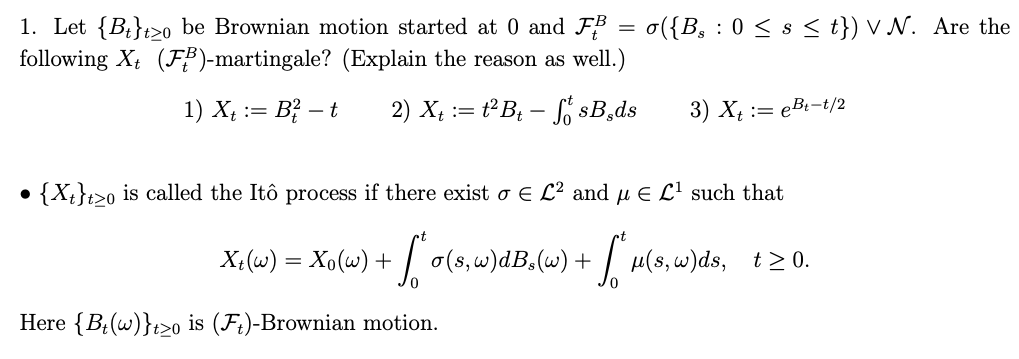Answered step by step
Verified Expert Solution
Question
1 Approved Answer
Let {B_(t)}_(t)>=0 be Brownian motion started at 0 and F_(t)^(B)=sigma ({B_(s):0 . Are the following x_(t)(F_(t)^(B)) -martingale? (Explain the reason as well.) x_(t):=B_(t)^(2)-t x_(t):=t^(2)B_(t)-int_0^t
Let
{B_(t)}_(t)>=0be Brownian motion started at 0 and
F_(t)^(B)=\\\\sigma ({B_(s):0. Are the\ following
x_(t)(F_(t)^(B))-martingale? (Explain the reason as well.)\
x_(t):=B_(t)^(2)-t\
x_(t):=t^(2)B_(t)-\\\\int_0^t sB_(s)ds\
x_(t):=e^(B_(t)-(t)/(2))\
{x_(t)}_(t)>=0 is called the It process if there exist
\\\\sigma inL^(2) and
\\\\mu inL^(1) such that\
x_(t)(\\\\omega )=x_(0)(\\\\omega )+\\\\int_0^t \\\\sigma (s,\\\\omega )dB_(s)(\\\\omega )+\\\\int_0^t \\\\mu (s,\\\\omega )ds,t>=0.\ Here
{B_(t)(\\\\omega )}_(t)>=0 is
(F_(t))-Brownian motion.

Step by Step Solution
There are 3 Steps involved in it
Step: 1

Get Instant Access to Expert-Tailored Solutions
See step-by-step solutions with expert insights and AI powered tools for academic success
Step: 2

Step: 3

Ace Your Homework with AI
Get the answers you need in no time with our AI-driven, step-by-step assistance
Get Started


